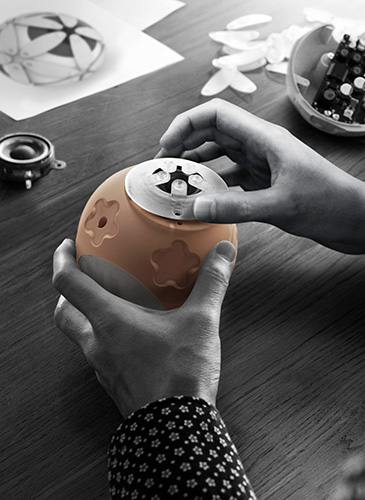Rapid prototyping is made possible for young entrepreneurs through innovative milling technologies.
By Philip Chu, Product Manager of Specialty Devices, Roland DGA
There are more entrepreneurs in 2024 than ever before. In fact, 93% of Gen-Zers have taken action toward exploring business ownership. As arguably the most tech-savvy generation to tackle entrepreneurship, those opting for non-traditional career paths soon after college are adopting immersive, tech-driven, sustainable ways to bring their ideas to life.
Creating a product from scratch is never an easy process, but advancements in technology and tools have significantly streamlined the journey of turning an abstract idea into a tangible prototype. These innovations have made the prototyping process faster, more accessible to designers who lack a highly technical background, and increasingly sustainable, empowering entrepreneurs to bring their visions to life with greater efficiency.
In the initial stages of the prototype development process, ideas are often conceptualized through sketches or digital models, and preliminary prototypes may be developed from simple materials like cardboard. When it comes time to develop a more sophisticated prototype, many find themselves at a crossroads, unsure of which materials and tools to proceed with. This stage of prototyping can be particularly challenging, as it often requires significant resources in terms of time, budget, and materials.
For young entrepreneurs navigating today’s tense economic climate, the pressure to deliver high-quality, functional prototypes that not only meet their design specifications but also hold up under the scrutiny of real-world testing without compromising the quality and functionality of the prototype will be the ultimate test. Modern developments in prototyping tools such as milling machines will aid in overcoming these barriers and bring high-quality products to market faster than ever before.

Milling technology for rapid prototype creation is an indispensable tool revolutionizing product development. Valued for their precision and versatility, milling machines can swiftly transform digital designs into physical prototypes.
Speeding up the prototyping process with advanced milling machines reduces long-term costs for young entrepreneurs and allows them to create intricate prototypes of snap-fit parts, models, tools, electronic parts, product designs, and proof-of-concept prototypes for thermal and structural trials that would be otherwise difficult to produce and would require a strong software and engineering background.
If we zoom out, milling technology has several key applications young product developers should be aware of including prototyping, model-making, and small-scale product production.
Milling for prototyping allows for the rapid development of physical models from digital designs. This enables developers to conduct structural trials, design refinement, and fit checks before the product goes into mass production. These steps are crucial in the product development process, allowing the creation of precise, polished products with shorter go-to-market lead times, ultimately saving teams and investors money and time.
Often, the prototype development process involves creating iterative versions of individual parts based on many rounds of feedback and testing. Using digital milling technology to quickly develop prototype parts accelerates this process and supports quick-turn proof-of-concept model development for client and investor presentations and evaluations. It is also more sustainable than traditional prototyping methods as excess materials can be contained and recycled.
In small-scale manufacturing, a milling machine can be used to produce custom parts, prototype printed circuit boards, and bring projects to life in a variety of materials. Unlike 3D printing which uses traditional ABS material to print a prototype, there are exponentially more materials that can be used to create prototypes through the milling process.
Highly versatile, milling machines can be used on a wide range of materials, making them suitable for many different applications. Some of the most common materials used include plastics such as ABS, acrylic, PVC, Delrin, and polyacetate. They can also mill organic wood materials like balsa and other soft woods. Additionally, milling machines can handle other materials like wax, foam, PCB, and even some metals when equipped with the appropriate tooling.
Milling machines can be used by today’s young entrepreneurs to turn their ideas into reality. They offer a cost-effective way to test materials most similar to the end product and, unlike 3D printers, are not limited to ABS filament. Plus, the affordability of milling machines is difficult to match with comparable technologies for prototype development.
In a time of economic uncertainty, this next generation of entrepreneurs is redefining the landscape with fresh perspectives and new ideas that challenge established norms and products. To accomplish this, they are leveraging immersive milling technology to kickstart product development and doing so in a cost and time-effective way. Ultimately, these young innovators are not just focused on profit but on creating solutions that have a meaningful impact on society, driving positive change in an increasingly complex world.

Philip Chu, Product Manager of Specialty Devices for Irvine, California-based Roland DGA Corporation is a sign and graphics industry veteran with a strong background in print production, marketing, and brand management. He is responsible for overseeing Roland DGA’s high-quality line of advanced, easy-to-use rotary engravers, impact printers, and laser decorators.
Tune in for a timely conversation with Susan Spence, MBA, the new Chair of the ISM Manufacturing Business Survey Committee. With decades of global sourcing leadership—from United Technologies to managing $25B in procurement at FedEx—Susan shares insights on the key trends shaping global supply chains and what they mean for the manufacturing outlook.